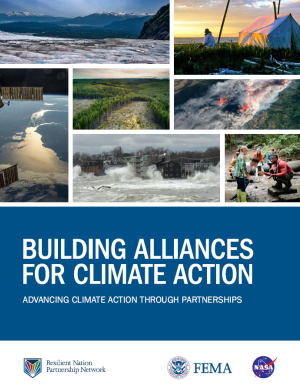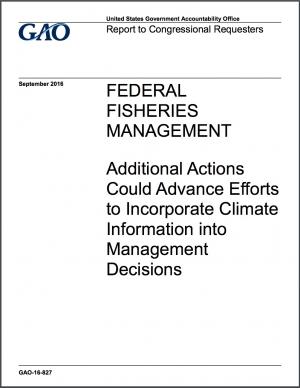Access a range of climate-related reports issued by government agencies and scientific organizations. Browse the reports listed below, or filter by scope, content, or focus in the boxes above. To expand your results, click the Clear Filters link.
To become climate resilient requires collective action. Our efforts must take a Whole-of-Government and Whole Community approach.
The Resilient Nation Partnership Network is working to address this through partnership. The result of our collective action is this Building Alliances for Climate Action resource. It is the work of many organizations and individuals, including federal representatives, faith leaders, community-based organizations, mayors and many more. At a time when many are searching for direction on how to address the climate crisis, this resource represents a unifying voice, helping guide the Whole Community forward
This guidance aims to enhance the capacity of health care facilities to protect and improve the health of their target communities in an unstable and changing climate. The document also intends to empower health care facilities to be environmentally sustainable, by optimizing the use of their resources and minimizing the release of waste into the environment. Climate resilient and environmentally sustainable health care facilities contribute to high quality of care and accessibility of services, and by helping reduce facility costs also ensure better affordability.
This document aims to:
- Guide professionals working in health care settings to understand and effectively prepare for the additional health risks posed by climate change.
- Monitor, anticipate, manage and adapt to the health risks associated with climate change.
- Guide health care facility officials to work with health determining sectors (including water and sanitation, energy, transportation, food, urban planning, environment) to prepare for additional health risks posed by climate change through a resilience approach, and to promote environmentally sustainable practices in providing these services.
- Provide tools to assist health care facility officials assess their resilience to climate change threats, and their environmental sustainability based upon the appropriate use of resources (in particular water and energy and sustainable procurement), and release of hazards (biological, chemical, radiological), to their surrounding environment.
- Promote actions to ensure that health care facilities are constantly and increasingly strengthened and continue to be efficient and responsive to improve health and contribute to reducing inequities and vulnerability within their local settings.
As climate changes and ocean temperatures rise, the abundance, distribution, and life cycles of fish in federally managed ocean fisheries may change too. Federal agencies managing ocean fisheries have limited information to determine exactly how climate change might harm specific fish populations, and may not always understand the potential effects. To better manage climate-related risks, the report recommends (1) the development of guidance on how to incorporate climate information into the fisheries management process, and (2) finalizing Regional Action Plans for implementing the NOAA Fisheries Climate Science Strategy that incorporate performance measures for tracking achievement of the Strategy’s Objectives.
Climate change is making the Arctic a greener, warmer, and increasingly accessible place for economic opportunity. However, climate impacts such as sea ice loss and rising ocean acidification are straining coastal community resilience and sound resource stewardship. NOAA's Arctic Action Plan outlines ways for scientists and stakeholders to share their progress regarding this vast, valuable, and vulnerable region.







